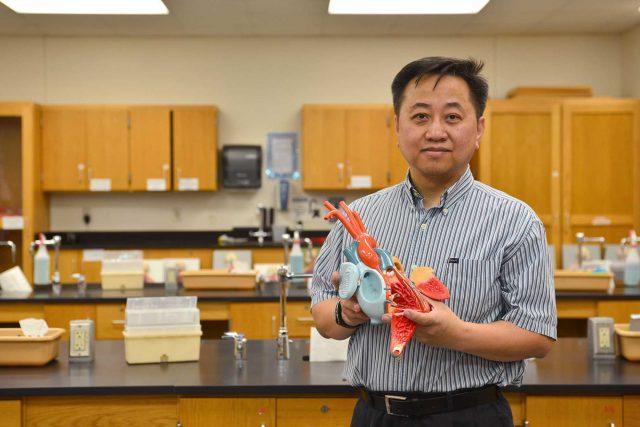By Hannah Lathen/ managing editor

Peter Matthews/The Collegian
SE student Janna Gentry lives with a mother who has Crohn’s disease and lupus, causing her to have stomach ulcers and inflamed joints.
Online student Laken Reeder has Sjogren’s syndrome, causing extreme pain and difficulties with eating.
TCC students are fighting hidden and misunderstood battles with autoimmune diseases. Even though they affect 1 in 6 people, many do not understand what they are or that they exist.
An autoimmune disease occurs in the body when one’s immune system starts attacking healthy cells. Instead of protecting the body from foreign invaders, the system starts hurting organs.
NE nurse Susan Alvarado says autoimmune diseases can be triggered by different events.
“Some are more genetic. Some are more environmental,” she said. “Some are chemically induced.”
Alvarado said it is important students let their campus nurse know about their condition and to let student accessibility resources know if they have special needs.
The more common autoimmune diseases are lupus, psoriasis, celiac disease and Type 1 diabetes. Over 80 different autoimmune diseases exist, and they affect the body differently.
For example, rheumatoid arthritis causes inflammation of the joints, and multiple sclerosis occurs when the immune system strips away the protective covering on nerves.
Some people can live regular lives while some remain sick and in debilitating pain.
Autoimmune diseases affect up to 50 million Americans, which is more than cancer and heart disease, according to the American Autoimmune Related Disease Association, which acknowledges March as Autoimmune Disease Awareness Month. Of those 50 million, 75 percent are women.
These diseases do serious harm when they are not diagnosed in time. Patients often go years without getting the proper treatment, and sometimes by then, sufficient damage has been done to organs.
Gentry’s mother suffers with both Crohn’s disease and lupus. Crohn’s disease causes her mother to have ulcers in the stomach, Gentry said.
“Whenever you eat, it is painful, and it ends up coming right back up. She is always throwing it up or going to the bathroom, which obviously causes a whole bunch of other issues like malnutrition,” she said. “Lupus mainly attacks the joints and also affects the skin. She gets rashes and things like that.”
Gentry lives at home with her mother and three other siblings.
“We try to do as much as we can to make her life easier like going to the grocery store, cooking dinner because she can’t because her joints are flaring,” she said. “She can’t stand up or get dressed by herself. I have even had to help her to the bathroom a few times because it has gotten so bad.”
The hardest part of having a mother who suffers from autoimmune disease, Gentry said, is not being able to help as much as she wants.
“It doesn’t matter the amount of times I say, ‘I am sorry’ or ‘I wish I could take your pain away,’” she said.
When it comes to how her mother deals with the diseases, Gentry said it took a few years for her mother to accept it, but she still has days where she gets frustrated.
“She is very strong-willed,” Gentry said. “Even when she is hurting, she tries to do as much as she can.”
Many times, Gentry’s friends don’t understand that she must take care of her mom more than they do, Gentry said. That attitude comes along with them not understanding her mother’s diseases.
“I just want people to know that because a person is sick, it doesn’t necessarily mean that they are incapable of doing things or wanting to be happy with their life, but at the same time, it doesn’t mean that they are lazy because they are hurting and they can’t do things that other people can,” she said.
Reeder suffers with Sjogren’s syndrome, a disorder that affects moisture-producing glands.
“It affects my nose, eyes, mouth and all of the glands in my body,” she said. “I also have mild joint pain. Some days, I wake up with swollen hands and feet.”
Headaches and low energy are some of the symptoms she experiences, but Reeder said the worst part is when the glands located in her jaw swell.
“It makes it hurt to brush my teeth, to chew gum, to eat,” she said. “When I was a senior in high school, my right gland had swollen to the size of a baseball.”
Sometimes, the pain from the swollen gland in her neck would hurt so bad that it brought her to the floor, Reeder said.
“The doctor told me I had TMJ [temporomandibular joint dysfunction], but we knew that was wrong because those were not my symptoms,” she said. “So then I went to an oral surgeon, and he thought it might be an infection and put me on some pretty harsh antibiotics, which did nothing for me.”
An MRI revealed nothing, she said, so she left it alone for a while. It wasn’t until she went in for a checkup with her OB-GYN bloodwork that revealed something was off.
“She referred me to a rheumatologist, and I got bloodwork done through them and they confirmed it,” she said.
Sjogren’s is treated systematically, Reeder said.
“They tell me to drink more water, get more sleep, not to do many demanding things in a day, and to suck on lemon drops to help my glands,” she said. “If my Sjogren’s gets worse throughout my lifetime, then there is medicine I can be put on, but at this age in my life, I try to do everything I can to prevent having to be put on medicine.”
The hardest part of her disease, Reeder said, was not having much energy since she works and goes to school.
“On my days off, I want to go do things, run errands and hang out with my friends and family, but sometimes I just don’t physically have the energy for it,” she said. “And it sucks some days not being able to eat anything because I’m in so much pain from my glands in my face swelling.”
Despite the symptoms, she said she does not let her disease control her life.
“I’m young, and it’s not going to prevent me from doing all of the things that I want to do,” she said. “I just take things one day at a time and do the best that I can.”




























